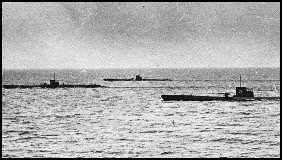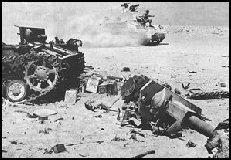 German U-boats hunt Atlantic convoys |
Project 60: A Day-by-Day Diary of WWII
Remembering the First Fight Against Fascism |
 British 8th Army tank moves past shattered DAK tank in Tunisia. |
 German U-boats hunt Atlantic convoys |
Project 60: A Day-by-Day Diary of WWII
Remembering the First Fight Against Fascism |
 British 8th Army tank moves past shattered DAK tank in Tunisia. |
Hitler, fearing that
his "best General" would be defeated in Tunisia, recalls Rommel, leaving von
Arnhim in charge of the Axis forces in Africa. Rommel would never return to that
theater. Heavy fighting at
Ksar Rhilane, southeast of Mareth, Tunisia is reported.
Leclerc's Free French troops fight off determined Axis attacks which
were heavily supported from the air. After raiding the
Mandalay-Mytikinia railline, the Chindit Brigade breaks up into several columns
and crosses the Irawaddy River between Tagaung and Tigyaing. Heavy street fighting
erupts in Kharkov as the SS Panzer Korps enters the city and manages to get to
the city center. Heavy fighting is
still reported in Kharkov as the Germans clear the Russians from the city. The
Germans break mobile forces from the city fight and drive south in an attempt to
cut off Soviet forces southwest of the city. Further to the north, the Germans
abandon and the Red Army occupies Vyazma as Army Group Center continues its
limited withdrawals to shorten their front. In an attempt to outflank the Marenth Line, Montgomery moves the 2nd New Zealand Division and the 8th Armored Brigade south from Medenine opposite Wilder's gap. Hitler, while
visiting Army Group Center's Headquarters in Smolensk narrowly avoids
assassination. The first attempt was to be made by machine-gunning his car, but
the motorcade sped by before Captain Boeselager's troops could open fire. The
second attempt was to be made during the luncheon, but Hitler and Field Marshal
von Kluge were seated next to one another and the conspiracy leader, Col.
Henning von Tresckow feared hitting his commander. Finally, Tresckow was able to
plant a time bomb on board Hitler's FW-200 Condor transport plane at Smolensk.
The detonator for the bomb, a British Plastic-C, failed to ignite due to its
sensitivity to low temperatures. From Berlin... The
German Army High Command issues the preliminary orders for Operation Zitadelle
(in English meaning Citadel) -- the plan to eliminate the Soviet held salient
centered on Kursk. Chinese forces counterattack the Japanese bridgehead over that Yangtze River and succeed in eliminating Japanese intrusion. The Allies score a victory with a submarine as HMS Thunderbolt sinks the Italian corvette Cicogna off the coast of Sicily. Kharkov changes hands for the third time in the war as German forces destroy organized resistance in the shattered city. Meanwhile, further north, Red Army forces capture Kholm and Zharkovskiy, as the German Army Group Center continues its withdrawal. Montgomery's 8th
Army begins probinb the approaches to the Mareth Line as it prepares to open
it's main offensive in Tunisia. Off the coast of Newfoundland, the eastbound fast convoy HX229 overtook the slow convoy SC122 and over the course of 4 days, the German U-boats of wolfpaks Raubgraf and Surmer, sunk 21 ships for the loss of one U-boat, U-384, at the hands of a Sunderland patrol craft. The disaster nearly ended the convoy scheme, but improvements in aircover were made which ultimately turned the tide in the Allie's favor The Japanese 33rd and 55th Divisions attack the British 123rd Indian Brigade, occupying defensive positions north of Rathedaung in Arakan. Threatened with being surrounded, the Indian's withdraw. Von Manstein's attack comes to a close as the "Grossdeutchsland" Division attacks Belgorod northeast of Kharkov, as the spring thaw and its accompanying sea of mud take over. In the attack, the overextended Red Army suffered 40,000 casualties and lose at least 600 tanks, and the Germans succeeded in stabilizing the southern half of the eastern front. However, the blow was nowhere near as devastating as the attacks of the summer of 1941. The Soviet Army was coming of age and able to fight with the Germans on a more level field. Elements of the US
2nd Corps captures Gafsa, Tunisia, and advances toward El Guettar. The New Zealand Corps begins moving toward Ksar Rhilane in preparation for Montgomery's attack on the Marenth Line As night falls,
Montgomery's long awaited attack on the Mareth line finally begins with a
massive barrage on Italian positions along the coast followed by attacks by the
British 50th Infantry Division. The New Zealand Corp was still
marching to their flanking position to the west. Italian forces
defending Tebaga Gap in Tunisia, put up a surprisingly determined defense,
stopping the New Zealand Corps' flank attack. Meanwhile, the main attack on
the Mareth Line, by British forces, in the morning has established a small force
across the natural antitank obstacle of Wadi Zigzaou, but ground conditions
prevent a further buildup. As the British attempt to expand their bridgehead over Wadi Zigzaou, German reserves from the 15th Panzer Division (with a mere 30 tanks in all) counterattack, ending the attempt. Meanwhile elements of 21st Panzer and 164th Light Divisions arrive at Tebaga Gap to stop t he new Zealand Corps' advance. 1941 Archive: 1942 Archive: 1943 Archive: Special Editions: Editor's Corner Archive: Hitler's Angle "The story of Prescott Bush and his association with the Nazis begins just before the end of World War I..." The Past Through Tomorrow "It is quite frightening to realize just how similar our nation's actions have been and appear to be heading when compared this way..." Afghanistan and Vietnam: When the "war against terrorism" began, many knowledgeable people warned that our operations in Afghanistan would turn into another Vietnam. Want to Win - Think Before You Lash Out - "If we are serious about taking the war to the enemy, it is time to look ..." The First Fight Against Fascism - We must remember the Spanish Civil War also. Arguing Victory - "... Each nation who fought against fascist tyranny in WWII brought with it part of whole needed to defeat that evil..." War, Glory, Honor and Remembrance - "War is a brutal and savage insult on human society..." The First
Casualty... in time of war, those in power are even more inclined to
hide the truth, since that truth is often manifest in the most gruesome and
terrible acts. Those wishing to contribute items. stories or comments should contact D.A. Friedrichs |